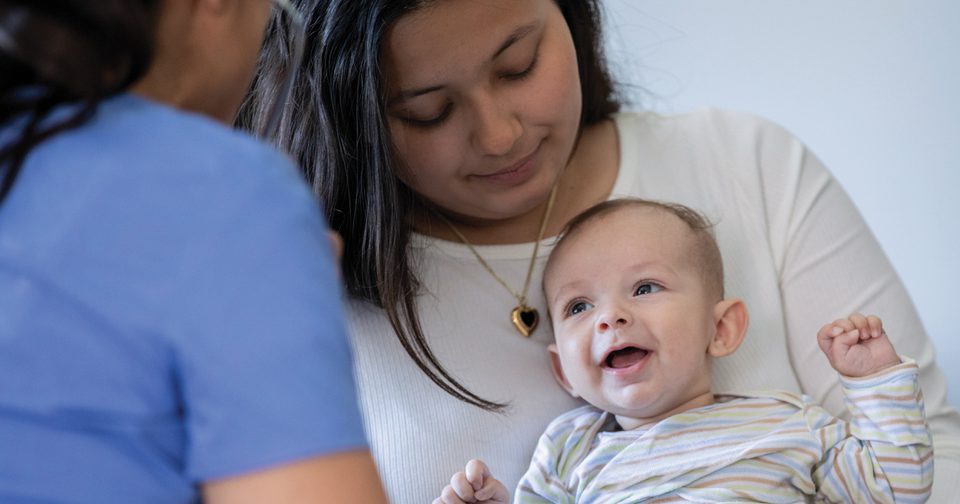From Crisis to Recovery: UPMC Magee Program Expands to Reach More Women in Western Pennsylvania

By: Gina Edwards
“People have this idea that they’re untouchable. And then it happens to them. It doesn’t matter what your status or income is — anyone can be affected by a substance use disorder. It can happen to anybody,” says Katie Beehner, a certified recovery specialist at the UPMC Magee-Womens Pregnancy and Women’s Recovery Center (PWRC) at UPMC Hamot.
The rise in the prevalence of substance use disorders among pregnant women has touched communities nationwide, including those in Western Pennsylvania. According to recent estimates, the number of women with substance-related diagnoses documented at delivery increased by 131% from 2010 to 2017.
“Erie has not been spared. We’ve seen increasing numbers of pregnant women with substance use disorders presenting in labor. Too many have had limited or no prenatal care, and even fewer received care for their addiction. Many hide their opioid use, while others don’t know where to access recovery services while pregnant. There has also been a steady rise in NICU admissions of babies with Neonatal Abstinence Syndrome,” explains Dr. Halina Zyczynski, medical director, Magee-Womens Research Institute, Erie Campus and Chair of OBGYN at UPMC Hamot. “It is impossible to ignore.”
In 2022, the PWRC at UPMC Hamot, an expansion site of the PWRC at UPMC Magee-Womens Hospital, secured funding from the Pennsylvania Department of Drug & Alcohol (DDAP) to significantly expand the number of personnel associated with the program. The expansion of addiction medicine services to the Erie area is part of a larger effort to scale comprehensive care to women across Western Pennsylvania and beyond.
Previously limited to one nurse case manager, DDAP funding has allowed the PWRC at UPMC Hamot to hire a peer navigator, social worker, and advanced practice provider to greatly expand the type of services offered to pregnant and parenting people in the Erie area.
“We’re looking at how we translate our model of care at Magee into the community setting, which involves tailoring our model to lower resources settings like Erie,” explains Dr. Elizabeth Krans, Director of the PWRC. “The DDAP grant was the first big step to allow us enough funding to support that community site and our expansion efforts in general.”
The PWRC at UPMC Hamot’s Comprehensive Care Model
“The care delivery process for this population is team-based: multidisciplinary, multiple care providers... it’s a comprehensive approach to health care,” explains Dr. Krans, who is also a primary investigator at Magee-Womens Research Institute.
To ensure standardization and consistency of care delivery in the expanded program, the Oakland, PA-based and Erie-based teams travel quarterly to shadow, learn, and model certain practices.
The Erie team’s nurse navigator, Lauren Kullen, started in March of 2022 and has since observed the number of referrals to the PWRC increase, both from self-referral and via community events where she’s presented. For each patient, Lauren works with her teammates, Isela Smith, a social worker, and Katie Beehner, a peer recovery specialist, to assist patients with various aspects of support, from housing, transportation, and care coordination to providing support for their actual delivery.
“We can give that full circle of care to make sure that they feel protected, feel safe, and provide education to hospital staff while they’re going through these experiences,” Lauren says.
The nature of the multidisciplinary care team also ensures a close-knit experience for patients.
“It’s an honor that they actually feel that they can trust me, and it’s great that I can use those traumatic experiences that I went through to help somebody else,” Katie says. “It’s more intimate with the three of us. There’s just something about having the option to have a nurse to help you with all your medical needs, a social worker for all those resources in the community, and I share my lived experience with recovery.”
Isela Smith, senior social worker at the PWRC at UPMC Hamot, adds that the centralized setup of the program is also more conducive to supporting patients, who might have difficulties related to transportation and childcare. “They can come here, and they can trust to talk to us,” Isela says. “We’re very supportive of them. They know that they can count on us to help them navigate what they need to do to stay on the right path.”
Dr. Zyczynski says that the wraparound services provide much-needed practical assistance for patients on their recovery journey: “A healthy pregnancy should not be a luxury, but it can feel unaffordable when you don’t have a working car, or you can’t afford gas at $5 a gallon. The DDAP grant has helped us meet some very basic needs of our patients, from hunger and food insecurity to neglected dental care and transportation barriers, which were leading to missed prenatal care appointments.”
The UPMC Hamot program has also partnered with organizations such as Safe Harbor for behavioral health support, and the Law Enforcement Treatment Initiative (LETI) that helps law enforcement connect individuals with substance use disorders identified in the field to treatment.
“It’s important that our clinical programs are invested in community partnerships,” explains Dr. Krans. “These community partners, such as LETI, have a direct line of communication to a lot of individuals who have substance use-related issues. It’s just another way that patients can access our services.”
Isela hopes that as more people learn about the program, they will seek support at the PWRC: “Come as you are. We’re here to help you.”
If you or a loved one or anyone you know needs help or consultation regarding a substance use-related issue, please visit the PWRC website here.
Learn more on the LETI program here.
Read the full Winter 2024 MAGEE Magazine issue here.